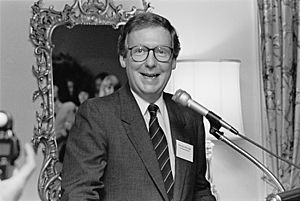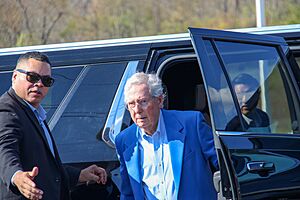Mitch McConnell facts for kids
Quick facts for kids
Mitch McConnell
|
|
|---|---|
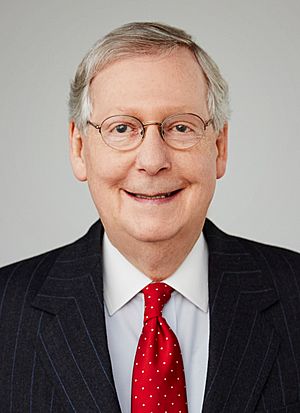
Official portrait, 2016
|
|
| Chair of the Senate Rules Committee | |
| Assumed office January 3, 2025 |
|
| Preceded by | Amy Klobuchar |
| In office January 20, 2001 – June 6, 2001 |
|
| Preceded by | Chris Dodd |
| Succeeded by | Chris Dodd |
| In office January 3, 1999 – January 3, 2001 |
|
| Preceded by | John Warner |
| Succeeded by | Chris Dodd |
| Senate Majority Leader | |
| In office January 3, 2015 – January 20, 2021 |
|
| Whip | |
| Preceded by | Harry Reid |
| Succeeded by | Chuck Schumer |
| Senate Minority Leader | |
| In office January 20, 2021 – January 3, 2025 |
|
| Whip | John Thune |
| Preceded by | Chuck Schumer |
| Succeeded by | Chuck Schumer |
| In office January 3, 2007 – January 3, 2015 |
|
| Whip |
|
| Preceded by | Harry Reid |
| Succeeded by | Harry Reid |
| Leader of the Senate Republican Conference | |
| In office January 3, 2007 – January 3, 2025 |
|
| Preceded by | Bill Frist |
| Succeeded by | John Thune |
| Senate Majority Whip | |
| In office January 3, 2003 – January 3, 2007 |
|
| Leader | Bill Frist |
| Preceded by | Harry Reid |
| Succeeded by | Dick Durbin |
| United States Senator from Kentucky |
|
| Assumed office January 3, 1985 Serving with Rand Paul
|
|
| Preceded by | Walter Dee Huddleston |
| Judge-Executive of Jefferson County | |
| In office December 1, 1977 – December 21, 1984 |
|
| Preceded by | Todd Hollenbach III |
| Succeeded by | Bremer Ehrler |
| United States Assistant Attorney General for the Office of Legislative Affairs | |
| In office February 1, 1975 – June 27, 1975 Acting |
|
| President | Gerald Ford |
| Preceded by | Vincent Rakestraw |
| Succeeded by | Michael Uhlmann |
| Personal details | |
| Born |
Addison Mitchell McConnell III
February 20, 1942 Sheffield, Alabama, U.S. |
| Political party | Republican |
| Spouses |
|
| Children | 3 |
| Education | |
| Signature | |
| Website | |
| Military service | |
| Branch | |
| Service | July 9, 1967 – August 15, 1967 (medical separation) |
Addison Mitchell McConnell III (born February 20, 1942) is an American politician and lawyer. He has been a United States senator for Kentucky since 1985. He is currently in his seventh term. McConnell is the longest-serving senator in Kentucky's history.
He was the leader of the Senate Republican Conference from 2007 to 2025. This included two times as the minority leader (2007–2015 and 2021–2025). He was also the Senate Majority Leader from 2015 to 2021. This makes him the longest-serving Senate party leader in U.S. history.
McConnell holds conservative political views. However, he was seen as a moderate Republican earlier in his career. He worked to block major plans during the Obama administration. He often used the filibuster to stop bills. He also blocked many of President Obama's choices for judges.
During the first Trump administration, McConnell led the Senate Republicans. They passed important laws like the Tax Cuts and Jobs Act of 2017. They also confirmed many federal appeals court judges. McConnell changed a Senate rule to make it easier to confirm Supreme Court judges. This allowed Neil Gorsuch, Brett Kavanaugh, and Amy Coney Barrett to be confirmed.
McConnell supported most of Trump's policies. However, he criticized Trump's efforts to change the results of the 2020 election. He also said Trump was "practically and morally responsible" for the January 6 United States Capitol attack.
In February 2024, McConnell announced he would step down as Senate Republican Conference Leader in January 2025. He will finish his current Senate term. In November 2024, John Thune was chosen to take his place. In February 2025, McConnell announced he would not run for an eighth Senate term in 2026. He plans to retire from politics.
Contents
Early Life and Education (1942–1967)
McConnell was born on February 20, 1942, in Sheffield, Alabama. He grew up in Athens, Alabama. His family owned a funeral home there. He has Scots-Irish and English family roots.
When he was two years old, McConnell's left leg was paralyzed by polio. He received treatment that helped him avoid being disabled for life. He said his family struggled financially because of his illness.
In 1950, his family moved to Augusta, Georgia. His father was in the Army and stationed there. In 1956, his family moved to Louisville, Kentucky. He attended duPont Manual High School. He was elected student council president in high school.
McConnell went to the University of Louisville. He earned a degree in political science in 1964. He was also president of the Student Council for Arts and Sciences.
In 1963, he attended the March on Washington for Jobs and Freedom. This is where Martin Luther King Jr. gave his "I Have a Dream" speech. In 1964, he worked as an intern for Senator John Sherman Cooper. He said this experience inspired him to run for the Senate later.
In 1967, McConnell graduated from the University of Kentucky College of Law. He was president of the Student Bar Association.
Early Career (1967–1984)
In March 1967, McConnell joined the U.S. Army Reserve. This was shortly before his draft deferment ended. He trained at Fort Knox, Kentucky, for a short time. He was diagnosed with a medical condition and honorably discharged.
From 1968 to 1970, McConnell worked for Senator Marlow Cook in Washington, D.C.. He was a chief legislative assistant. He helped with writing speeches and assisting people from Kentucky.
In 1971, McConnell returned to Louisville. He worked on a campaign for governor. He also tried to run for a state legislature seat but did not meet the residency rules. He then worked for a law firm and taught political science at the University of Louisville.
In 1974, McConnell returned to Washington. He worked for President Ford as a Deputy Assistant Attorney General. He also served as acting Assistant Attorney General in 1975.
In 1977, McConnell was elected Jefferson County Judge/Executive. This was the top political job in Jefferson County, Kentucky. He won against the person already in office. He was reelected in 1981. He held this job until he was elected to the U.S. Senate in 1984.
U.S. Senate (1985–Present)
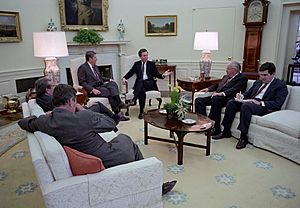
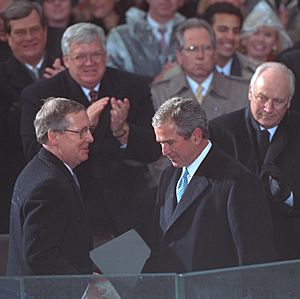
When he first started in politics, McConnell was seen as a moderate Republican. Over time, he became more conservative. He has been described as a skilled political strategist.
From 1997 to 2001, McConnell led the group that helps Republicans win Senate elections. In 1999, he voted to remove Bill Clinton from office during his impeachment trial. He became the Majority Whip in 2003.
After Republicans lost control of the Senate in 2006, McConnell was elected minority leader. When Republicans gained control in 2014, he became the Senate Majority Leader. In 2018, he became the longest-serving Senate Republican leader ever. He is also the longest-serving U.S. senator from Kentucky.
McConnell used to get special funding for projects in Kentucky. This practice was called "earmarks". Congress stopped this in 2010.
Working with Presidents
Obama Administration
As the top Republican in the Senate, McConnell often challenged the Obama administration. He worked to keep Republicans united against the president's plans. He believed that opposing the president would help Republicans win more elections.
In 2010, McConnell said his main goal was for President Obama to serve only one term. He aimed to slow down the Democratic agenda. He also used the threat of the U.S. defaulting on its debt to gain leverage.
McConnell worked to delay and block major laws. These included healthcare reform and banking reform. By slowing down the Senate, he limited how many bills Democrats could pass.
Using the Filibuster
One of McConnell's main ways to delay bills was the filibuster. A filibuster is when a senator speaks for a very long time to stop a vote. To end a filibuster, 60 senators must vote to stop the debate.
In 2013, the Senate Majority Leader, Harry Reid, changed a rule. He made it so that most presidential nominations could not be filibustered. However, Supreme Court nominations still needed 60 votes.
In April 2017, Senate Republicans, led by McConnell, changed this rule again. They removed the 60-vote requirement for Supreme Court nominations. This was done to confirm Neil Gorsuch.
Trump Administration
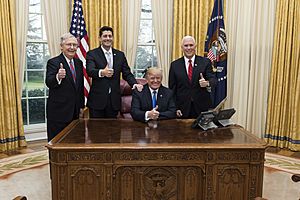
McConnell supported Donald Trump for president in 2016. However, he sometimes disagreed with Trump. For example, he criticized Trump's comments about a judge's heritage. He also spoke out when Trump criticized a soldier's parents.
In 2017, some of Trump's allies blamed McConnell for slowing down legislation. McConnell pointed to the confirmation of Neil Gorsuch as proof of Senate support for Trump's plans.
After Joe Biden won the 2020 election, McConnell at first did not recognize Biden's win. He said Trump had the right to challenge the results. But he did not repeat Trump's false claims of voter fraud.
On December 15, 2020, after the electoral college vote, McConnell publicly congratulated Biden. On January 6, 2021, he spoke against efforts to overturn the election. He called the storming of the Capitol a "failed insurrection".
First Impeachment
In November 2019, as the House of Representatives began impeachment hearings for President Trump, McConnell said he was "pretty sure" how the trial would end. He said it would not lead to Trump's removal from office.
In December 2019, McConnell said he would work closely with the White House for the impeachment trial. He also said there was "no chance" the Senate would convict Trump. He refused to call witnesses, saying the Senate's role was to judge, not investigate. He stated he was "not an impartial juror" because it was a political process.
After Trump was acquitted, McConnell was praised for keeping Republican senators united.
Second Impeachment
In January 2021, it was reported that McConnell supported impeaching Trump for his role in the Capitol attack. He believed it would help Republicans move past Trump. However, he did not call an emergency Senate meeting for the trial. He wanted to delay it until after Biden's inauguration.
McConnell voted to acquit Trump in February 2021. He said it was unconstitutional to convict a president who was no longer in office. But after the vote, he strongly criticized Trump. He said Trump was "practically and morally responsible" for the events of January 6. He explained that if Trump were still president, he would have considered convicting him.
McConnell later voted against creating an independent commission to investigate the January 6 attack.
Second Term
McConnell stepped down as Senate Republican leader in 2024. John Thune was elected to take his place. McConnell has voted against some of Trump's cabinet choices in his second term. He announced he will retire at the end of his term in 2027.
Biden Administration
McConnell has had a good relationship with the Biden administration. President Biden has called McConnell "a friend" and "a man of his word." McConnell has praised bipartisan laws they worked on together.
In October 2021, McConnell helped pass a bill to extend the debt ceiling. He convinced 11 Republicans to vote for it. This prevented the U.S. from defaulting on its debts.
Judicial Nominees
Under Obama
During Obama's time as president, McConnell led Senate Republicans in blocking many of his choices for federal judges.
In 2009, after Obama nominated Sonia Sotomayor to the Supreme Court, McConnell said her record needed careful review. He later announced he would vote against her, saying she might not be impartial. Sotomayor was confirmed days later.
In 2010, Obama nominated Elena Kagan. McConnell opposed her confirmation. He said she was not open enough about her views on constitutional law. Kagan was confirmed the next month.
In 2014, Republicans gained control of the Senate. McConnell used his power to block many of Obama's judicial appointments. The number of federal judge openings at the end of Obama's term was more than double that at the end of George W. Bush's term.
In February 2016, Supreme Court Justice Antonin Scalia died. McConnell immediately said the Senate would not consider any Supreme Court nominee from Obama. He said the American people should have a voice in choosing the next justice. In March 2016, Obama nominated Merrick Garland. Under McConnell's direction, Senate Republicans refused to take any action on the nomination. Garland's nomination expired in January 2017.
McConnell later said that refusing to act on Garland's nomination was "the most consequential decision" of his career.
Under Trump
In January 2017, President Trump nominated Neil Gorsuch to fill Scalia's Supreme Court seat. Gorsuch was confirmed in April 2017. This happened after McConnell removed the filibuster for Supreme Court nominees.
In July 2018, Trump nominated Brett Kavanaugh to the Supreme Court. McConnell supported Kavanaugh. He accused Democrats of distorting Kavanaugh's record. Kavanaugh was confirmed in October 2018.
In October 2018, McConnell said if a Supreme Court opening happened in 2020, he would not repeat his 2016 decision. He argued that because Republicans controlled both the presidency and Senate in 2020, the situation was different. In September 2020, after Ruth Bader Ginsburg died, he announced the Senate would vote on Trump's nominee. Amy Coney Barrett was confirmed in October 2020.
Government Shutdowns
The federal government shut down in October 2013 because Congress could not agree on funding. McConnell later promised Republicans would not force another shutdown in 2014.
2018–2019 Shutdown
From December 2018 to January 2019, the federal government shut down. This happened because Congress would not agree to Trump's demand for $5.7 billion for a border wall.
During this shutdown, McConnell blocked the Senate from voting on funding bills. He said it was not his job to mediate between the Senate and Trump. Democrats criticized McConnell for not allowing a vote.
The shutdown ended on January 25, 2019. Trump signed a temporary funding bill without money for a border wall. This was the longest government shutdown in U.S. history.
COVID-19 Response
When the COVID-19 pandemic began, McConnell initially opposed a relief bill. He called it a Democratic "wish list." He changed his mind when Trump supported the bill. It passed the Senate with strong support.
McConnell also led Senate Republicans in talks for two other COVID-19 relief packages. The CARES Act was the largest economic stimulus package in U.S. history. It passed with support from both parties.
In April 2020, McConnell suggested that states should declare bankruptcy instead of getting more COVID-19 aid. This was criticized by state and local officials.
After the CARES Act passed, McConnell waited several months before pushing for more relief. He said Congress should "hit pause" to see how the funds were working.
In September 2020, a smaller COVID-19 relief bill from McConnell failed to pass the Senate. Democrats blocked it, calling it "inadequate."
Approval Ratings
McConnell has often received low approval ratings. This is partly because he is a leader for Republicans, and many Democratic voters disapprove of him. He has also had low approval from some Republican voters who support Trump.
In 2012 and 2016, polls showed McConnell had the lowest home-state approval rating of any sitting senator. In 2017, he had the highest disapproval rating of any senator.
In September 2019, his approval rating in Kentucky was 36% positive and 50% negative. In 2020, another senator, Susan Collins, became slightly less popular than McConnell.
Committee Assignments
McConnell's committee assignments for the 118th Congress include:
- Committee on Agriculture, Nutrition, and Forestry
- Subcommittee on Commodities, Risk Management, and Trade
- Subcommittee on Conservation, Climate, Forestry, and Natural Resources
- Subcommittee on Food and Nutrition, Specialty Crops, Organics, and Research
- Committee on Appropriations
- Subcommittee on Agriculture, Rural Development, Food and Drug Administration, and Related Agencies
- Subcommittee on Defense
- Subcommittee on Energy and Water Development
- Subcommittee on Interior, Environment, and Related Agencies
- Subcommittee on Military Construction and Veterans' Affairs, and Related Agencies
- Subcommittee on State, Foreign Operations, and Related Programs
- Committee on Rules and Administration (Chair)
Political Views
McConnell has held conservative views for many years. He has opposed stricter campaign finance laws. He also led efforts to repeal or replace Obamacare.
He has opposed stronger regulations, gun control, and efforts to fight climate change. He has criticized proposals like the Green New Deal and Medicare for All. He has supported stronger border security, free trade, and lower taxes. As Senate majority leader, he helped pass the Tax Cuts and Jobs Act of 2017.
In foreign policy, he has supported sanctions on countries like Cuba, Iran, and Russia. He has supported Ukraine during its invasion by Russia. He also supported Israel in its Gaza war. He voted for military action against Iraq in 2003.
Earlier in his career, in the 1960s and 1970s, McConnell had more moderate views. He supported civil rights. After the Supreme Court ruled on same-sex marriage, McConnell said he believed marriage was between one man and one woman. However, he acknowledged the Court's decision was the law.
Electoral History
Almanac
| United States Congressional Service | |||||
|---|---|---|---|---|---|
| Years | Congress | Chamber | Senate
Majority |
Senate
Vice President |
Constituency |
| 1985-87 | 99th | U.S. Senate | Republican | George H.W. Bush | Kentucky |
| 1987-89 | 100th | Democratic | |||
| 1989-91 | 101st | Dan Quayle | |||
| 1991-93 | 102nd | ||||
| 1993-95 | 103rd | Al Gore | |||
| 1995-97 | 104th | Republican | |||
| 1997-99 | 105th | ||||
| 1999-2001 | 106th | ||||
| 2001-03 | 107th | Dick Cheney | |||
| 2003-05 | 108th | ||||
| 2005-07 | 109th | ||||
| 2007-09 | 110th | Democratic | Joe Biden | ||
| 2009-11 | 111th | ||||
| 2011-13 | 112th | ||||
| 2013-15 | 113th | Republican | |||
| 2015-17 | 114th | ||||
| 2017-19 | 115th | Mike Pence | |||
| 2019-21 | 116th | ||||
| 2021-23 | 117th | Democratic | Kamala Harris | ||
| 2023-25 | 118th | ||||
| 2025–present | 119th | Republican | J.D. Vance | ||
Electoral Results
| Year | Office | Type | Party | Main opponent | Party | Votes for McConnell | Result | Swing | ||||||
|---|---|---|---|---|---|---|---|---|---|---|---|---|---|---|
| Total | % | P. | ±% | |||||||||||
| 1984 | Senator | Primary | Republican | C. Roger Harker | Republican | 39,465 | 79.22% | 1st | N/A | Won | N/A | |||
| General | Walter Dee Huddleston (I) | Democratic | 644,990 | 49.90% | 1st | +13.03% | Won | Gain | ||||||
| 1990 | Primary | Republican | Tommy Klein | Republican | 64,063 | 88.52% | 1st | +9.30% | Won | N/A | ||||
| General | Harvey I. Sloane | Democratic | 478,034 | 52.19% | 1st | +2.28% | Won | Hold | ||||||
| 1996 | Primary | Republican | Tommy Klein | Republican | 88,620 | 88.59% | 1st | +0.07% | Won | N/A | ||||
| General | Steve Beshear | Democratic | 724,794 | 55.45% | 1st | +3.27% | Won | Hold | ||||||
| 2002 | General | Republican | Lois Combs Weinberg | Democratic | 731,679 | 64.68% | 1st | +9.22% | Won | Hold | ||||
| 2008 | Primary | Republican | Daniel Essek | Republican | 168,127 | 86.09% | 1st | −2.50% | Won | N/A | ||||
| General | Bruce Lunsford | Democratic | 953,816 | 52.97% | 1st | −11.7% | Won | Hold | ||||||
| 2014 | Primary | Republican | Matt Bevin | Republican | 213,753 | 60.19% | 1st | −25.9% | Won | N/A | ||||
| General | Alison Lundergan Grimes | Democratic | 806,787 | 56.19% | 1st | +3.22% | Won | Hold | ||||||
| 2020 | Primary | Republican | C. Wesley Morgan | Republican | 342,660 | 82.80% | 1st | +22.61 | Won | N/A | ||||
| General | Amy McGrath | Democratic | 1,233,315 | 57.76% | 1st | +1.57% | Won | Hold | ||||||
1984 Election
In 1984, McConnell ran for the U.S. Senate. He won by a very small number of votes. He was the only Republican Senate challenger to win that year. This happened even though Ronald Reagan won the presidential election by a lot.
1990 Election
In 1990, McConnell won his election by 4.4%.
1996 Election
In 1996, he won by 12.6%. This was even though Bill Clinton won Kentucky in the presidential election that year.
2002 Election
In 2002, he ran unopposed in the Republican primary. He then won the general election by a large margin.
2008 Election
In 2008, McConnell had his closest election since 1990. He won by 6%.
2014 Election
In 2014, McConnell faced a challenge in the Republican primary. He won with 60.2% of the vote. This was the lowest support for a Kentucky U.S. senator in a primary since 1938. He then won the general election by a significant margin.
2020 Election
In November 2020, McConnell won his seventh term. He defeated his opponent by almost 20 percentage points.
Personal Life
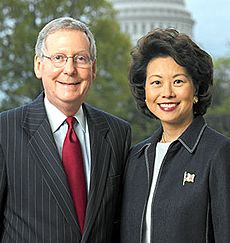
Family and Background
McConnell is a Southern Baptist. He was married to Sherrill Redmon from 1968 to 1980. They had three daughters: Porter, Eleanor, and Claire. After their divorce, Redmon became a scholar.
McConnell married his second wife, Elaine Chao, in 1993. She served as Secretary of Labor and Secretary of Transportation in different presidential administrations.
Health
McConnell's upper left leg was paralyzed by polio when he was a child.
In 2003, he had heart surgery for blocked arteries. In 2019, he fractured his shoulder after a fall. In March 2023, he was hospitalized for a concussion and a minor rib fracture after another fall. He did not return to the Senate for almost six weeks. He also fell while getting off a plane in July 2023. In December 2024, he fell again, spraining his wrist and cutting his face.
In July and August 2023, McConnell had moments where he froze and stopped speaking during press conferences. His staff helped him, and he later said he was "fine." His doctor stated he was "medically clear" to continue his schedule.
Other Interests
In 1997, McConnell started the James Madison Center for Free Speech. This is a legal organization in Washington, D.C.
In 2018, he was ranked as one of the wealthiest members of the U.S. Senate. His wealth grew in 2008 after he and his wife received a gift from her father.
See also
 In Spanish: Mitch McConnell para niños
In Spanish: Mitch McConnell para niños
 | Anna J. Cooper |
 | Mary McLeod Bethune |
 | Lillie Mae Bradford |









